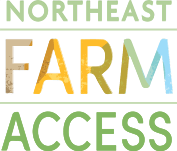
By Michelle Hughes, NEFA Summer Intern
A few weeks ago, I had the pleasure of attending the National Farm Viability Conference with a few members of the NEFA team in the historic city of Albany, New York. Hosted at the new Capital Center in the heart of downtown, the conference touched on the many facets of farm viability and more generally on building a more sustainable food system in the U.S. While the group of speakers was diverse–ranging from value-added food company owners to policymakers of the USDA–most were asked the same question: “How is your work ensuring farm viability?”
When the time came for NEFA’s founder to represent our work on a panel, I found myself asking that very same question. What about NEFA’s work creates and fosters forever farms? What challenges do we face in guaranteeing the viability of our farms for 30 years (or more)?
The answer to this isn’t simple, and it shouldn’t be. The issues we face in creating and ensuring viability to our farmers and their work is complex and therefore call for elaborate and creative solutions. What have been identified as the most significant barriers to farm viability–lack of access to capital, land, education/training and markets–each have obstacles even within their logical solutions. NEFA addresses these issues by joining together a team of individuals who each bring a unique set of skills and insight to the evolving world of agricultural real estate and investment, but still share the common goals of supplying increased access to good, local food and ensuring farm viability.
Together, we are able to identify former farmland that is prime for organic restoration and pair it with investors passionate about seeing a reward in the land and making the food system more sustainable. With capital from our financial backers, we are able to offer our farmers the option to lease on a 30-year basis as opposed to owning. Additionally, we maintain close relationships with programs bringing in the next generation of farmers and providing them with the technical and business skills necessary to be successful in our model.
Alliances like these give our team access to qualified groups of farmers in our recruitment process. Lastly, farms growing on NEFA properties access a variety of markets ranging from direct to consumer to institutional wholesale. In many ways, we procure solutions to problems that attempt to overcome adversity while simultaneously create a complete new model for agriculture and the food system on a large scale.
The theme for the closing remarks of the conference last week was inclusivity and combined efforts. The speakers mostly mentioned how companies of different natures can work together to discover new methods for farmers that will aid in their business’ survival. NEFA is doing just that–creating access where it is lacking by making connections between all of the right people. I am delighted and honored to be working as an intern for our founder this summer and more importantly, inspired each day that I learn more about the NEFA model. Cheers to a summer of more long-term connections and bountiful harvests.

Leave a Reply